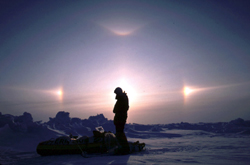Timeline North Pole
At the North Pole, you will start in the winter approaching summer. Just as at Antarctica however, don't start out too late. Around March 5 is the starting time out from Russia, as the Borneo base close early May. Canada flies out from the pole until end May, extending starting time to around March 15.

The Borneo base closes early May. It is possible to arrange for a pick up from Canada instead, however, the Russian route suffers much open water initially, and the later you go the worse the conditions. If you leave late from Russia and still want to do the trek in it's proper length and unsupported (no air assistance), be prepared to swim and even sail!
Another complication is that the Canadians won't be able to pick you up or even rescue you too far from the pole (towards the Russian side). You'd better make it and make it in time with this arrangement.
Leaving from Canada allows for a later departure date. But the last flights out are end May, so to allow 65 days trek and 5 days for bad weather pick up wait, you need to leave no later then mid March. Many, many expeditions leave too late because they simply are busier talking to media than organizing their stuff. In addition, many fear the cold of early departure. But leaving late will really expose you to much open water, fog and rotting ice. New York Times better be worth it - for you will suffer for the fame and possibly even lose the pole. If you are serious in your mission - arrive organized and leave in time.
So why start out early if it's cold? Interestingly enough, the dark season is warmer than the arrival of sun. The coldest period is just as the sun begins to climb above the horizon. If you go early, the first part of your trek will be dark but not too cold. With the sun's arrival, the temperatures can reach below -45C and more, but the days are generally sunny and calm. There will be less polar bears as they depend on open water leads which doesn't break up until warmer weather.
One month later, as you are closer to the pole, the temperature warm up considerably. The leads open up and the seawater vapor will blanket you in an almost eternal fog. Open water leads are your worst enemy on the Arctic ice. Starting too late from Russia, you'll dive nose straight into them. Starting too late from Canada, you'll be in trouble close to the pole.